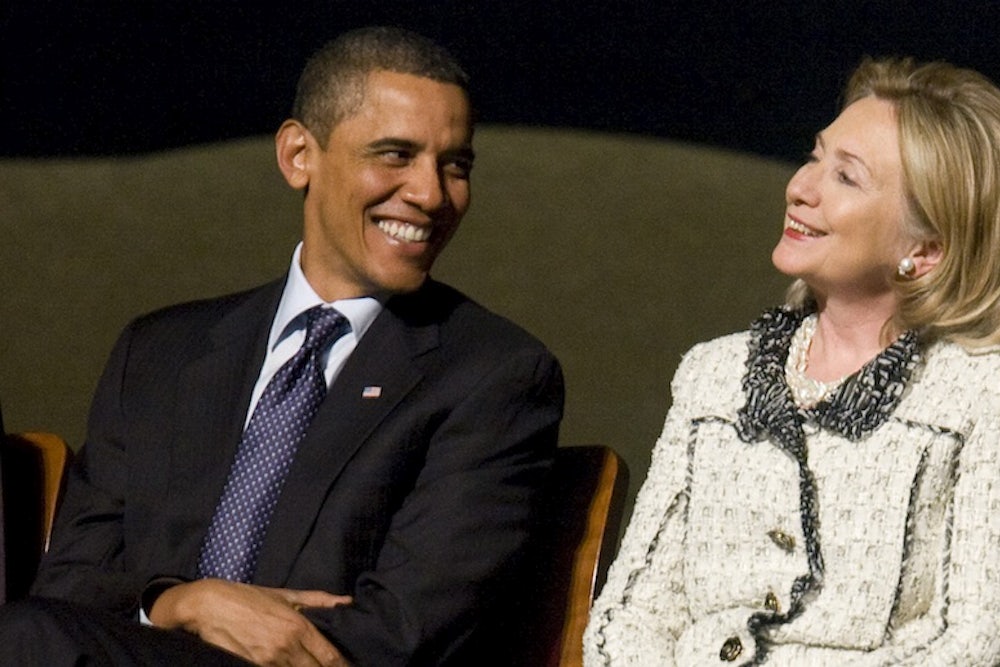After the Republican sweep in November, the conventional thinking about Obama’s last two years in office was pretty bleak. Actually, the conventional thinking about Obama’s last two years in office has been bleak since 2011. Republicans locked the House down so tightly back then that only congenital optimists held out any hope for reviving his legislative agenda. Economic growth—slow and steady enough to get him re-elected—was too slow and too steady to juice his favorables. A series of international crises diminished public confidence in his approach to foreign affairs.
For those reasons, many observers expected him to muddle through 2015 and 2016. Or to become a wallflower. His agenda would recede. His hoped-for successor, Hillary Clinton, would shun him and criticize his policies. He would be confined to beating back the Republican agenda with serial, politically damaging vetoes.
Nearly two months later, that analysis looks incredibly shaky. In fact, if the trends that have defined the past six weeks hold, the analysis will prove wrong in every particular—and would dramatically reorient the expected course of legislative and campaign politics for the next two years. It could even shape Clinton’s campaign platform, which many Democrats feared would be thin and uninspiring, into something substantial.
Three factors have conspired to upend the conventional wisdom, or at least to threaten it.
First, Obama has announced a series of executive actions, which have in turn allowed him to control the very agenda he had supposedly ceded to the GOP, to the delight of his exhausted political base.
Second, the economy is growing at a genuinely impressive clip—fast enough to propel the recovery to escape velocity.
Third, a consequence of both previous factors, Obama’s approval rating has ticked upward. Locked for months in the low 40s, it blipped up to 47 in Gallup’s daily tracking poll, and appears to have settled in the mid-40s. Not stratospheric, but perhaps climbing out of the doldrums.
None of these developments is guaranteed to hold. But together they pose an immense threat to the Republican Party’s hopes of using agenda-setting power on Capitol Hill to bolster its presidential nominee and divide Democrats. And if these developments do hold, something like the opposite will happen.
The political consequences of a booming economy and the ancillary impact that would have on Obama’s popularity, and thus on Democratic electoral fortunes, are plain. They don’t require detailed explication.
Maintaining a highly regimented schedule of executive actions, on the other hand, comes with no guarantee that any individual action will prove popular and durable, or that the public will applaud aggressive governing from within the executive branch. But Obama is operating with the benefit of insights he gained from watching the Republican Party’s infantry-like opposition to his legislative agenda, and the GOP leadership’s shaky control over rank and file members. He also understands that making decisions in the White House is much easier, procedurally, than passing bills in Congress.
His ambition, then, will be to promulgate actions that enjoy broad support within the Democratic caucuses on Capitol Hill, but either divide Republicans or unite them in a way that stokes their worst impulses.
The biggest actions he’s taken thus far—deferred deportation, normalization of relations with Cuba—both fit the bill, as do forthcoming EPA rules that will limit greenhouse gas emissions. In every case, perhaps against the better judgment of party leaders, Republicans have allowed the environment they’re trying to establish to become polluted by divisive politics. Rather than set Obama back on his heels, they are reacting to him, and in ways that reveal themselves, rather than him, to be reflexively hostile and stubborn.
Writing at The Washington Post, Paul Waldman characterized this dynamic as a reimagining of the bully pulpit. Using policy actions, rather than publicity stunts, to focus Congress’ attention on the president’s agenda—except in this case, Obama’s perfectly happy if Congress’ reaction is viscerally negative.
A strategy along these lines has deep implications because it places extremely consequential, but easily reversible, policies on the ballot. For them to mean anything in the long term, the Democrats’ 2016 nominee has to agree with Obama, and she has to win. It is thus no surprise that Hillary Clinton has announced unequivocal support for the steps Obama has taken so far. This isn’t happenstance. It’s the budding of her legislative agenda.
If Republicans win the White House in 2016, many of the steps Obama has taken in recent weeks, and will take over the next several months, will be halted or reversed. But if Clinton or another Democrat is elected, Republicans will have to reconsider their reluctance to legislate with a Democratic president.
Four years into a Clinton presidency, federal policies like deferred action and greenhouse gas regulation will be deeply rooted. U.S. relations with Cuba will be significantly normalized. Eight years on, reversing any of them outright will be unthinkable. Republicans would thus be confronted with a choice between another decade of voluntary abdication in the federal policymaking realm, and placing a conservative imprimatur on all of these substantive realms in exchange for making the thrusts of the policies permanent. If Hillary Clinton is able to leverage the enshrinement of executive actions undertaken during Obama’s presidency to pass legislation that addresses climate change and U.S. immigration in comprehensive and lasting ways, her presidential legacy will exceed her husband’s and rival Obama’s.
She would be able to accomplish, with fresh tactics, what Obama simply can’t at this point. And all because he’s refusing to exile himself the way a late-term president is expected to.
